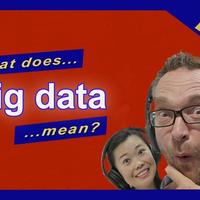What does 'big data' mean? - YouTube
Feifei: Neil, what are you doing? That's
the biggest spreadsheet I've ever seen!
Neil: Hi, Feifei. Yes, just you wait.
I'm developing a product
that will revolutionise
English teaching!
Feifei: Great. So why are you looking at
screens of numbers?
Neil: Not numbers, data. Big data!
This is what I need. And that is
the expression we're
talking about in The English We Speak.
Feifei: How do you plan to use this data?
Neil: I haven't figured it out yet.
But that's not important.
Everyone's talking about big data.
Feifei: It is a hot topic. But big data is
all about analysis. You need to know what
to do with all that data.
Neil: Right.
Feifei: What you are looking at is
a list of... football scores...
from every country...
in 1987?!
Neil: Ah, yes. Not useful?
Feifei: Sadly not! Let's listen to this
explanation of what big data actually is.
We are surrounded by data. Every time
we use social media, buy
something online, or even search
for information, we are creating data.
Because there's so much of it,
and because it comes
in many forms, we call it big data.
Companies collect and analyse big data
to discover hidden trends and patterns.
For example, online retailers use big data
to learn what kinds of things customers like,
so they can suggest new products to buy.
Feifei: You're listening to The English We
Speak from BBC Learning English.
Our expression in this
programme is 'big data'. So, Neil,
how's your research going now?
Neil: Not well. It's hard to know
where to start.
Feifei: Well, you'll probably need
information on things like spending
patterns on language
learning apps, key times users
log in and how long sessions last,
how demand varies
by language level, data on first languages,
data on which kind of content is most...
Neil: OK. Stop, stop, stop. I'm trying
to write all this down. Feifei?
Feifei: Yes?
Neil: Can I hire you as a big data analyst?
Feifei: Sorry, Neil, you're too late. I'm
launching a product of my own.
It helps predict
football scores. In fact, I need a bit
more data from...1987!
Neil: Well, I might just be able
to help you out there!
Feifei: Yes, I think you were actually
looking at my screen earlier.
Neil: Sorry! You know, I think I'll leave
this big data stuff to the experts.
Feifei: Bye.
Neil: Bye.

